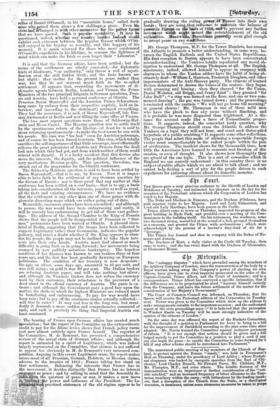It is said that the German affairs have been settled
; but the terms of the settlement are wholly concealed,—for diplomatic hints at disclosure, "on authority," only throw a veil of mysti- fication over the still hidden truth; and the facts known are but slight : they incline for the present to peace rather than war, but they do not warrant much faith in the so-called settlement. It appears that, overriding the movements of di- plomatic agents between Berlin, London, and Vienna, the Prime Ministers of the two principal litigants in German questions, Prus- sia and Austria, have held a personal conference at Olmiltz. The Prussian Baron Manteuffel and the Austrian Prince Sehwartzen- berg came by railway from their respective capitals, held an in- terview, and (according to the statement) arranged everything. They had the assistance, it is said, of Baron Mayendorff, late Rus- sian Ambassador at Berlin and now filling the same office at Vienna.
The two most urgent questions were those of Schleswig-Hol- stein and Hesse-Cassel. The Hessian question was to settle itself by the spontaneous return of the Elector—at least he is said to mean returning spontaneously—to make the best terms he can with his people. His case was " too bad " even for Austrian patronage, and of coarse he has been forced to return. This step, which totally sacrifices the self-importance of that little sovereign, most effectually relieves the great potentates of Austria and Prussia from the dead lock into which they had got, and from which neither of them could retreat with dignity. It is a lucky accident that this device also saves the interests, the dignity, and the political influence of the very meritorious Hessian people. That question, therefore, was struck out of the programme for the Olmfitz conference. The Schleswig-Holstein question is said to have been settled by Baron Mayendorff,—that is to say, by Russia. Now it is impos- sible to have faith in the settlement of any German question by the dictum of Russia ; nor is there proof that any matter at this conference has been settled on a real basis,—that is to say, a basis taking into consideration all the interests, popular as well as royal, all the facts and existing circumstances. We have no evidence that the settlement is any other than one of those games with di- plomatic dissecting-maps which are rather going out of date. Meanwhile, enormous armies have been assembled ; and although to pursue the war would have been embarrassing and costly, it will be scarcely less embarrassing to get rid of those vast gather- ings. The address of the Second Chamber to the King of Prussia shows that the people will be disappointed if Prussian or " Ger- man" pretensions have been waived at Olmtitz. A placard Circu- lated at Berlin, suggesting that the troops have been collected to support Legitimacy rather than Germanism, indicates the popular jealousy, and raises a doubt whether if the King appears to aban- don his people, the people may not be inclined to take their inte- rests into their own hands. Austria must find almost as much difficulty in going back as in going forward ; her movements being cramped by now publicly notorious bankruptcy. The hopeless (rendition of her finances was known to our readers three or four years ago, and the fact has been gradually dawning on European politicians. The condition of her treasury is now desperate : the agio on silver, some days ago, amounted to 45 per cent, and was still rising; on gold it was 60 per cent. The Italian traders are refusing Austrian paper, and will take nothing but silver; and although the Viennese iraders dare not refuse the currency used by their customers, their reluctance is the precursor of a dead stand in the official currency of Austria. The panic is ex- treme ; and although the Government puts a good face upon the matter, the shifts to which the highest Ministers are reduced must be humiliating and embarrassing. To pay for war would have been ruin; but to pay off the enormous armies actually collected— will that be easier ? It may cost less in the long run, but mani- festly it demands a more sudden and comprehensive command of cash, and cash is precisely the thing that Imperial Austria can least command.
























 Previous page
Previous page